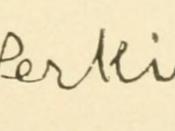Driving Mrs. Crazy "The Yellow Wallpaper," by Charlotte Perkins Gilman was written in the late 1800's during the time when a woman's voice was muted by society. Gilman uses this short story as a way to portray how a woman is seen as insignificant for anything other than childbearing. The severity of the male's opinion of a female's role is taught by Gilman to be a failure. After reading Gilman's story, I have come to the conclusion that the obvious wallpaper was not her main reason for slipping into insanity. The narrator's husband, John intrigues me; his behavior and attitude toward his wife disgust me. He quickly assumes the role of a patronizing, controlling husband who allows his career as a doctor to abort his position as a caring and concerned husband. While the wallpaper seems to trap the narrator, John is the true cause of her captivity and eventual insanity.
In "The Yellow Wallpaper," "the dominant/submissive relationship between an oppressive husband and his submissive wife pushes her from depression into insanity" ("Dom./Sub."1). Gilman's narrator is seen as being someone trapped mentally and physically by her husband, which is evident from the beginning of the story (Korb 3). Small descriptions of her being neglected and ignored can be detected in many lines of the story. For instance, the narrator asks John if she can have a room downstairs that Wells 2 opens on the piazza, but he will not hear of it. This shows the reader that Gilman's narrator is striving for some space of her own, but the room that she desires does not have any room nearby for John to sleep. Instead of her requests being filled, John takes control and places her in the upstairs, a place where she is disconnected from the rest of the home. The narrator immediately recognizes her captivity in writing that, "John hardly lets me stir without special direction" (Korb 3).
Once the narrator has time to feel the nature of the room, the wallpaper seriously disturbs her. Her husband, however, once again ignores her cries and refuses to give in to her fancies. John at this point becomes a character that not only ignores her but also puts himself first. He is unwilling to admit that his wife might have a serious illness ("Dom./Sub."1). This is made obvious when he tells her that to change the wallpaper would be absurd because then the bedstead, the barred windows and the gate at the head of the stairs would have to be changed. That would be too much trouble for him (Korb 3).
Even though the narrator recognizes her captivity, does she really realize her husband's need for control? If she does recognize his controlling behavior, she never confronts him. Instead she outwardly relies on John's advice. By relying on John, she feels she is preserving her sanity, a word defined by John, because she does not have the energy to resist him (Korb 3).
John takes on the role not only as a husband to her but as a father to her. The room that he places her in he calls a nursery. Her treatment that John enforces is complete isolation; this includes no writing, friends or reading. He limits her in such a way that can be interpreted as helpful, but it is really cruelty. He does not even inform Wells 3 her of the basic causes of her ailment as if he is sheltering her much like that of a father's role (Wagner-Martin 2). His treatment, much like the names he uses when addressing her, is completely patriarchal. He refers to her as "Blessed Little Goose" and "Little girl," names that seem only suited to be used when addressing a child. Just as a father might shrug off the suggestions or ideas of a small child, John does the same to the narrator, for "listening to her is the last thing on his mind" (Wagner-Martin 2). Throughout the story she warns him that her health is not progressing and his reply is, "Bless her little heart! She shall be as sick as she pleases! But now let's improve the shining hours by going to sleep, and talk about it in the morning!" He clearly does not see her as an adult capable of expressing her opinion; instead she is a helpless child (Wagner-Martin).
John becomes her guard just as easily as he acted like her father. Several times throughout the story she mentions writing in her journal, but she has to put it down because she hears John coming and he does not like it when she writes a work ("Dom./Sub." 2). When she requests that she be moved someplace where she might be able to get "advice and companionship about her work," he refuses (Korb 4). If he moves her, then he feels that he is giving in to her "false and foolish fancy" (Korb 4). He keeps her virtually a prisoner in a room with only wallpaper for entertainment and nothing that can stimulate her mind; therefore, she is forced to meditate on her sickness. Because she has no relief from her husband, her guard, she is forced to find companionship with the yellow wallpaper (Korb 4).
Her husband finally realizes his medicine is wrong for his wife. He faces his failure as he faints, crashing on the floor next to the wall. Suddenly he is no longer Wells 4 the husband, the father or the guard; instead he is the defeated. John, in the instant from the time he sees the destruction of the bedroom to the time he realizes that she is not cured, faints at his own failure. He knows that the wife he controlled and the daughter he "kept safe" have found escape. He fails in every aspect that his character possesses. His diagnosis is wrong, his treatment is wrong and his own approach is terribly mistaken. Her husband becomes the object that serves only one purpose, to get in her way. As she looks down at his body, she creeps over him and this shows her final triumph.





